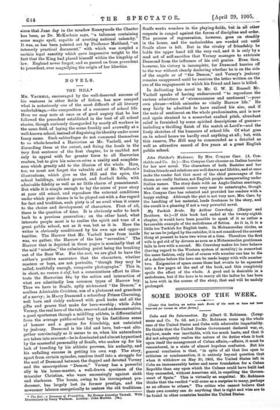MR. VACHELL, encouraged by the well-deserved success of his ventures
in other fields of fiction, has now essayed what is notoriously one of the most difficult of all literary undertakings,—the composition of a romance of school life. Here we may note at once as of good augury that he has followed the precedent established in the best of all school stories, though curiously disregarded by nearly all workers in the same field, of laying the scene frankly and avowedly at a well-known school, instead of disguising its identity under some
fancy name. Such subterfuges do not commend themselves to so whole-hearted a Harrovian as Mr. Vachell, and by discarding them at the outset, and fixing the locale in the very first sentence of the first chapter, he is enabled not only to appeal with far greater force to all Harrovian readers, but to give his raise-en-scene a reality and complete- ness which greatly add to the illusion of the whole. Here, too, we must not forget the valuable aid of Mr. Wadham's illustrations, which give us the Hill and the spire, the school buildings, cricket ground, and football fields, with admirable fidelity as well as no little charm of presentment. But while it is simple enough to lay the scene of your story at your old school, and reproduce the external conditions under which your drama is to be played out with a due regard for fact and tradition, such piety is of no avail when it comes to the choice and development of characters. First of all, there is the question of time. It is obviously safer to hark back to a previous generation ; on the other hand, what interests people most is to realise the spirit and tone of a great public school, not as it was, but as it is. Here the writer is obviously conditioned by his own age and oppor- tunities. The Harrow that Mr. Vachell knew from inside was, we gather, the Harrow of the late "seventies." The Harrow that is depicted in these pages is nominally that of the mid "nineties," the culminating point being the breaking out of the Boer War. For the rest, we are glad to have the author's positive assurance that the characters, whether masters or boys, are not portraits, "though they may be called, truthfully enough, composite photographs." This is, in short, no romaa a clef, but a conscientious effort to illus- trate the Harrovian it/oc by the action and interaction of what are admittedly less common types of Harrow boy. Thus we have in Scaife, aptly nicknamed "the Demon," a soulless Admirable Crichton, son of a plutocrat and grandson of a navvy; in Harry Desmond a schoolboy Prince Charming, well born and richly endowed with good looks and all the gifts and graces that make for hero-worship ; while John Verney, the real hero of the tale, reserved and undemonstrative, a good sportsman though a middling athlete, is differentiated from the average public-school boy by his fastidious sense of honour and a genius for friendship, not untainted by jealousy. Desmond is his idol and hero, but—not alto- gether convincingly as it seems to us, when his antecedents are taken into account—he is dominated and almost hypnotised by the masterful personality of Scaife, who makes up for his lack of breeding by his athletic prowess, his audacity, and his unfailing success in getting his own way. The story, apart from certain episodes, resolves itself into a struggle for the soul of Desmond between the dogged and devoted Verney and the unscrupulous "Demon." Verney has a powerful ally in his house-master, a well-drawn specimen of the Muscular Christian, who wars unceasingly against sloth and slackness. The house, owing to his incompetent pre- decessor, has largely lost its former prestige, and the newcomer labours energetically to restore the old traditions.
* The 11121: a Romance of Friendship. By Horace Annesley Vachell. With Illustrations by Percy Wailliam London : John Murray. [6.4 Scaife works wonders in the playing-fields, but in all other respects is ranged against the forces of discipline and order. The process of regeneration, however, goes on steadily in the house, and the undesirables are weeded out until Scaife alone is left. But in the rivalry of friendship he holds the upper hand till the very end, and it is only by a mad act of self-sacrifice that Verney manages to extricate Desmond from the influence of his evil genius. Even then, however, his victory is incomplete, for Desmond hurries off to the war without clearly declaring whether he is on the side of the angels or of "the Demon," and Verney's jealousy remains unappeased until he receives the letter written on the eve of the engagement in which his friend and hero is killed.
In dedicating his novel to Mr. G. W. E. Russell Mr. Vachell speaks of having endeavoured "to reproduce the curious admixture of strenuousness and sentiment '—your own phrase—which animates so vitally Harrow life." He may fairly be admitted to have realised his aim, and if the note of sentiment on the whole predominates, and is now and again strained to a somewhat exalted pitch, abundant relief is furnished by some spirited descriptions of games— including a thrilling finish of the match at Lord's—and the lively sketches of the humours of school life. Of what goes on in school hours we hardly read anything at all ; but, with this reserve, The Hill may be commended as a detailed as well as attractive record of five years at a great English public school.


















































 Previous page
Previous page